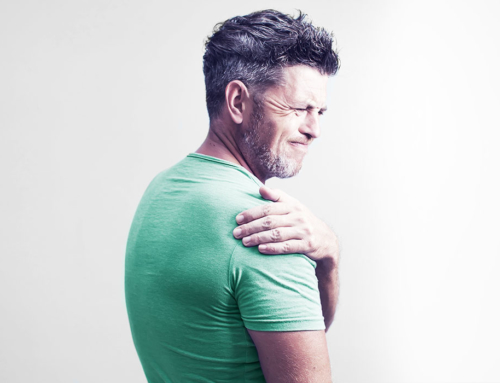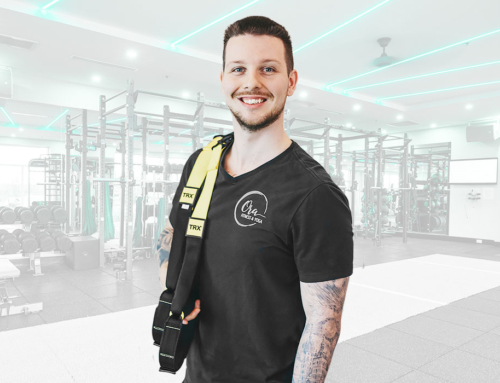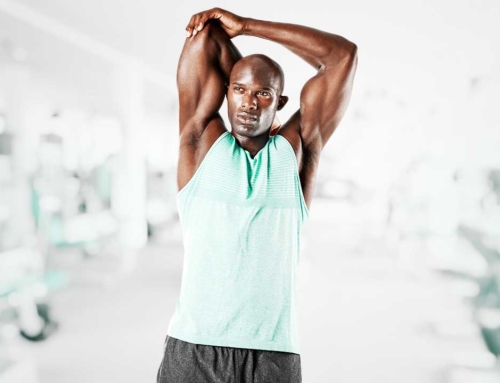Fit women often lose their menstrual period when training hard or dieting to lose fat. While some think it’s no problem, this couldn’t be further from the truth.
A typical scenario I’ve experienced a handful of times with female clients goes like this:
Sally Sue is young, active, and healthy. She eats a “clean” diet, lifts weight twice a week, and does about two hours of distance running four or five days a week.
Then, all of a sudden at the age of 29 she stopped getting her periods. She didn’t mention it to her me, and it never occurred to her to consult a doctor about it. In fact, secretly, she felt relieved. After all, she didn’t want to get pregnant. Besides, dealing with her monthly cycle had become a hassle. It interfered with her exercise program that she was committed to, and worse yet the weight fluctuations played with her mind every time she stepped on the scale.
So… no period, no problem. Right? Wrong.
Taking a More In Depth Look
The menstrual cycle is a series of changes women’s bodies go through when preparing for the possibility of getting pregnant. Here’s the break down:
Every month, one of the ovaries releases an egg. At the same time, throughout the body, hormonal changes prepare the uterus for pregnancy. A hormone called gonadotropin-releasing hormone (GRH) is sent from the hypothalamus to the pituitary gland. This cellular cross-talk then triggers the pituitary to release two other hormones: follicle stimulating hormone (FSH) and luteinizing hormone (LH).
These hormones then travel to the ovaries and tell them to make estrogen and progesterone. Of course, the amount produced depends on the which phase of the menstrual cycle one is in. If ovulation takes place and the egg is not fertilized, the lining of the uterus sheds through the vagina, and this is what most people think of as a “period”.
Now back to Sally Sue.
What went wrong with this normal process? And why does this happen to so many women who train? In simple terms, a woman’s body is susceptible to energy fluctuations. When a woman is eating a restricted diet, or she’s exercising strenuously for hours every day, her body recognizes this negative energy balance as a threat to her survival.
Essentially it shuts down “non-essential” body processes such as reproduction. In short, she becomes infertile. The scientific term for this is process is called hypothalamic amenorrhea.
Young girls now get their first period earlier than in our previous generations. This situation may be because, on average, kids are heavier than in the past. But to understand that, you need to recognize the relationship between the hormone leptin and the hypothalamus.
Body fat produces leptin. When a child gains enough weight, there is a threshold amount of leptin produced to signal the hypothalamus to kick off the first menstrual cycle. Since children are becoming heavier sooner than they used to, their periods are also starting sooner. The opposite is true for women who get too lean or who restrict calories too much.
Getting too lean decreases the amount of leptin circulating in the body. This process, in turn, reduces the activity of the hypothalamus. Since Sally Sue was restricting calories, exercising almost every day, and losing body fat, this combination of factors could have triggered the loss of her period.
Let’s talk about stress!
Women’s physiological sensors are highly tuned in to sensing deficits. Whether in energy balance, essential nutrients, or body fat, women’s bodies quickly respond to deficiencies.
The deficit set point as I like to call it will vary from woman to woman. Some women can be naturally and genetically leaner, can work out with higher volume and intensity, or can eat fewer calories while staying hormonally healthy. Other women’s systems are more sensitive to any perceived restriction.
Of course, stress of any kind will make things worse.
For many female athletes or simply just active women, the demands of training and competing, pressure to succeed, and other normal life stressors such as jobs, school, finances, relationships, etc. can combine with nutritional and physiological stressors to shut the system down. The same thing can happen when the sympathetic nervous system our “fight-flight” system, is overtaxed.
For example:
- If we rely too much on stimulants such as caffeine
- If we don’t calm down and often recover, giving our parasympathetic nervous system our “rest and digest” system, time to activate
- If we’re always in self-critical, “gotta do it all myself”, control-freak or perfectionist mode
- If we don’t get enough quality sleep
- If we skip meals or fast too restrictively or too often
- If we beat the heck out of ourselves with too many, too-demanding high-intensity workouts
Then our stress hormones are always on “high alert,” telling our bodies that threats lurk around every corner, and it’s not safe to reproduce. Since many female athletes or recreational exercisers can also be driven, high-achieving people who seek out stress and challenge, and push themselves to be ever-better. This process is usually the perfect storm.
Why is hormonal health important?
Unless you’re planning on starting a family, infertility and losing your period might seem like no big deal. It might even look like a nice break from the hassle of having periods. Take a second to think about this. Remember that your period isn’t just about pregnancy. Rather, it’s a sign of normal hormonal health.
In other words, losing your period or even having significant irregular periods means that something is “off” hormonally. Think of your period as a dashboard indicator light in your car. When you lose it, the light starts blinking.
In the case of hypothalamic amenorrhea, those messages we talked about earlier, from the hypothalamus to the pituitary to the ovaries significantly diminish, and means the production of hormones like estrogen and progesterone is dangerously reduced. Why is that a problem? Your body needs these hormones for bone strength. They’re also required to keep you feeling healthy, energetic, and even-keeled psychologically.
In fact, because of the link between estrogen, progesterone, and bone health, many fit young women who lose their periods end up with weaker bones. Which includes my client Sally Sue, who regularly performs weight-lifting exercise, and whose diet is rich in calcium and vitamins D and K. Neither strength exercise or proper nutrition is enough to make up for hypothalamic amenorrhea.
Unfortunately, a lot of young female athletes aren’t aware of their body’s needs for estrogen, so when they lose their periods as part of their training, they take it for granted. The first issue that often drives women like Sally Sue to the doctor is not the loss of menstruation. It’s a mysterious pain in one of their quads. The cause of that pain, as their doctors can easily discover with a little investigation is a stress fracture.
This happens so often that there’s even a name for the syndrome: the Female Athlete Triad.
The core symptoms of the Female Athlete Triad are:
- Being without a period for three months
- Decreased bone mineral density
- Low energy availability
Estrogen and progesterone, along with other sex steroid hormones such as testosterone, have wide-ranging effects throughout our bodies.
So if your hormones are disrupted, you might also experience:
- Fatigue and low energy
- Disturbed sleep
- Hair loss
- Cold hands and feet
- Skin problems like dry skin or acne flare ups
- Weight changes
- Slow injury healing; more inflammation
- Anxiety
- Anemia
- Chronic pain
- Changes in digestion
Did you know that men are at risk too?
Although the syndrome may be called the “female athletic triad,” males are not immune to a similar phenomenon.
Just like in women, when a man’s energy availability is chronically low, his hormonal health is at risk. We often see testosterone plummeting too. The same hypothalamus, pituitary, ovary/testis link is the culprit. It’s the same disruption pattern.
So if you’re a guy, please don’t think this article is irrelevant to you. You should be especially cautious. After all, you don’t have that visible signal, a missed period, to warn you that you’re at risk. Which is why we all need to keep energy in balance or health will suffer.
While energy deficits are probably the most common cause amenorrhea in female athletes, and low thyroid hormone and or testosterone production in men, they’re not the only cause.
Sometimes just introducing a few vitamin and mineral supplements, your energy balance can return and for women their periods could return. Of course, negative energy balance and nutrient deficiency are intimately connected. If you’re not getting enough food overall, you’re probably also missing out on specific micro-nutrients.
Now that we’re getting technical, for more information I suggest speaking with our Naturopath, Dr. Rory Gibbons. Don’t ignore a series of missed periods. Along with nutritional deficiencies and energy imbalance, you could be dealing with quite a few underlying severe health issues. Not to scare you or anything, but this is why it’s so important to see your doctor if you stop getting your periods. Even if you don’t want to get pregnant.
So what happened with Sally Sue?
I told her to cut down on a bit on her cardio training. She also started eating 500-1000 additional calories each day. Within a few months, she did gain a few pounds. However, because we replaced some of her cardio with weights, most of that gain was lean.
Either way, not only did we improve her strength and lean mass, without causing fat gain, we also enhanced her hormonal health, reducing her risk for other health problems.
What you can do?
If you’re a health-conscious woman, who works out and eats well take note: Losing your period isn’t something to take lightly. If your menstrual cycle becomes irregular or stops altogether:
- Consider taking a high-quality vitamin/mineral supplement
- Consider adjusting your carbohydrate intake to consume a handful of slow-digesting carbs at most meals
- Mindset matters. Hormones respond to thoughts and feelings along with nutrients or activity
- Make sure you’re meeting your body’s energy needs
- Increase calories or reduce exercise by a little bit
- Ensure you’re getting enough rest.
And of course, see your doctor to rule out underlying problems. Or better yet book with our Naturopath, Dr. Rory Gibbons.
It’s never too late to start making healthier choices. Because, while you may not want to start a family today, you only have one body, so you might as well treat it well!









Leave A Comment